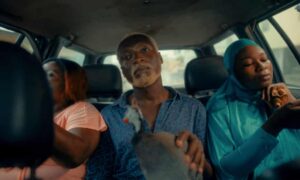
Arare Ghanian film featuring a queer main character could not have been released at a worse time for its director and cast. Joewackle J Kusi was making finishing touches to his short film, Nyame Mma (Children of God), and arranging screenings in the capital, Accra, when a piece of legislation passed through Ghana’s parliament, targeting LGBTQ+ content.
According to the bill approved in late February, those involved in the “wilful promotion, sponsorship or support of LGBTQ+ activities” will face jail sentences of up to five years. The legislation, awaiting presidential endorsement before it becomes law, also stipulates a prison sentence of between six months and three years for those found guilty of identifying as LGBTQ+.
Kusi says the bill’s passing forced him to cut the schedule short, to just one private screening for prominent art and film figures. It was shown on 6 March, Ghana’s independence day, at a venue in Accra, but Kusi has no idea if it will ever reach a wider audience.
“I was nervous, I was anxious because of the bill,” Kusi says. “The safety of my cast and crew kept me up at night.
“We considered that it was safer to just have one night. We didn’t go big because it didn’t feel safe to screen a film with a queer character in Ghana around the time this bill was passed.”
Nyame Mma tells the story of Kwamena (played by Kobina Amissah-Sam), who moves away from home to live in Bolgatanga, a town in northern Ghana, because of family friction over his sexuality. After the sudden death of his father, the 30-year-old queer man returns home to Sekondi, in the country’s south-west.
There, he meets his estranged lover, Maroof (played by Papa Osei A Adjei), who, under intense societal pressures, is about to marry a woman. Kwamena is left grieving not just for his father, but also the loss of Maroof.
In a touch of magical realism, Kwamena, in a dream sequence, meets his father in the afterlife. The film also alludes to Sekondi’s annual masquerade – the Ankos festival – with spirits featuring in surreal episodes.
Finding actors willing to play queer characters was a major challenge during Nyame Mma’s production. Kusi choose straight actors because “if I had to cast queer actors then they would have to go in hiding”.
“People read the script and said beautiful things about it but said they can’t act the role,” he says.
“Growing up, every single time I have seen a queer representation in a Ghanian film it’s been in negative light. You’ll see them at the end of the film giving their life to Christ, or they’re probably on the bed dying from some STDs. I felt that shouldn’t be the only real representation, so I tried to create positive characters.”
